Reflexive pronouns (both personal and possessive) that are adverbal or adnominal modifications are assigned a separate node in the tectogrammatical tree and they always get the t-lemma substitute #PersPron. Reflexive pronouns always take part in grammatical coreference relations. They mainly corefer with the closest subject; if no subject is present in the same subtree, the reflexive corefers with the subject of the next higher subtree.
Personal reflexives. The expression coreferred to by the personal reflexive se in active constructions is almost always the subject of the governing verb, which corresponds to the ACT argument. In periphrastic passive constructions, the coreferred expression is the subject of the governing verb again; in this case it is usually the PAT argument. Cf.:
-
Sobě nedopřeje matka nikdy nic. (=lit. To_herself not_let_have Mother never nothing; meaning: Mother never treats herself to anything pleasant)
The reflexive pronoun sobě corefers with the subject matka (=mother), which corresponds to the Actor argument.
-
Žádná práce by neměla být konána pro sebe samu, ale pro potěšení vlastní a druhých. (=No work should be done just for (the work) itself...)
The reflexive pronoun sebe corefers with the subject práce (=work), which corresponds to the Patient argument.
More examples:
Informace o tom, co o sobě, dva roky po rozvodu, už nevíme {#PersPron.ACT}. (=Information about the things we don't know about each other (lit. self) two years after the divorce) Fig. 9.1
Neschopnost opozičních stran {#Cor.ACT} vzdorovat své vlastní lenosti. (=Inability of the opposition parties to resist their (lit. self's) own laziness) Fig. 9.2
Possessive reflexives. With the possessive reflexive svůj, the situation is more complex. It can also be said that svůj primarily (and most often) corefers with the nearest subject but there are also other possibilities:
-
with control verbs (see Section 2.4.2, "Types of control verbs"), if the controller is an argument different from the one corresponding to the subject.
In such cases svůj (which is in the subtree the root node of which represents the infinitive the subject of which is the controllee) does not corefer with the closest subject (i.e. with the subject of the infinitive), but with the subject of the control verb; cf.:
-
Mnohá ze svých děl Reich nedovoluje {
#Gen.ADDR} {#Cor.ACT} provozovat bez vlastní hráčské účasti. (=Reich doesn't allow (anybody) to play his (lit. self's) pieces without him playing as well)The possessive reflexive svůj corefers with the subject of the control verb dovolovat (Reich), and not with the closest subject, which is the controlled subject represented by the node with the
#Cort-lemma (the controller is the Addressee of dovolovat). Cf. Fig. 9.3.
-
-
in clauses where the verb is in the 3rd person.
In such clauses, svůj can corefer with any argument, not only the one corresponding to the subject. These uses of svůj are often non-standard; cf.:
-
Jejich kajakářské disciplíny oplývají desítkami vynikajících soupeřů a je také pravděpodobné, že při svém profesionálním přístupu k závodění i k životosprávě jim chybí trochu víc uvolněnosti. (=...it is possible that with their (self's) attitude, they might lack the ability to relax)
The possessive reflexive svůj corefers with the Patient jim (=them), which is not in the subject position. Cf. Fig. 9.4.
-
Also using the pronoun jeho (=his) instead of svůj (=self's) is more and more frequent nowadays. The speaker's intention is respected, the pronoun is left in the form it was used and the given coreference relation is represented in the tree. Cf.:
-
Představitelé České lotynky tvrdí, že v souvislosti se současnou negativní kampaní v některých sdělovacích prostředcích nezaznamenali pokles zájmu o jejich loterijní hry. (=...they haven't registered any decrease of interest in their [not self's] lottery)
The pronoun jejich (=their) is used instead of svůj (=self's) (which would be the standard use). This is taken to be a case of textual, not grammatical coreference. Cf. Fig. 9.5.
These days, especially in the language of commercials and newspapers, the possessive (non-reflexive) pronoun is more and more often used also in the 1st or 2nd person (instead of the reflexive), e.g.:
Užijte si vaši dovolenou! (=Enjoy your holidays!)
Also in these cases the annotation respects the intention of the speaker, the pronoun is left unchanged and the coreference type follows from the used form.
Figure 9.1. Coreference with reflexive pronouns
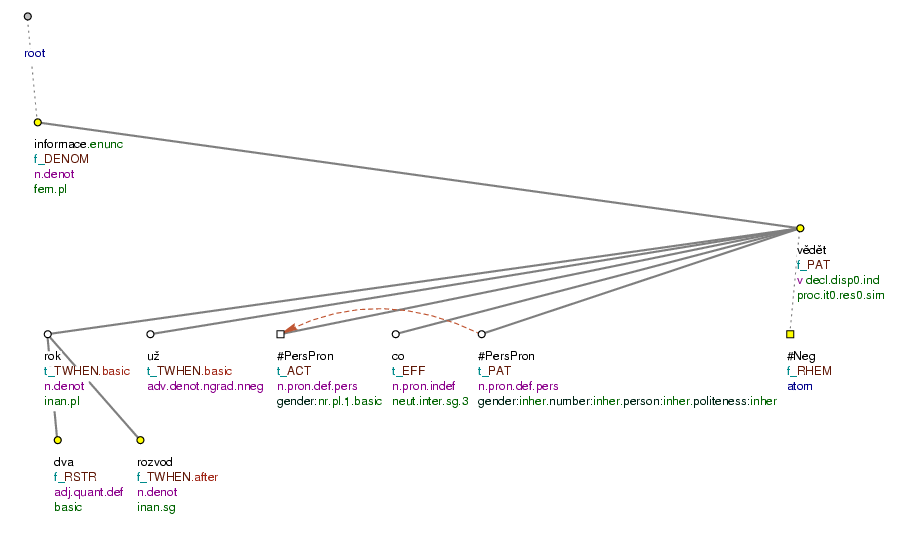
Informace o tom, co o sobě, dva roky po rozvodu, už nevíme. (=lit. Information about that, what about self, two years after divorce, (we) already not_know)
Figure 9.2. Coreference with reflexive pronouns
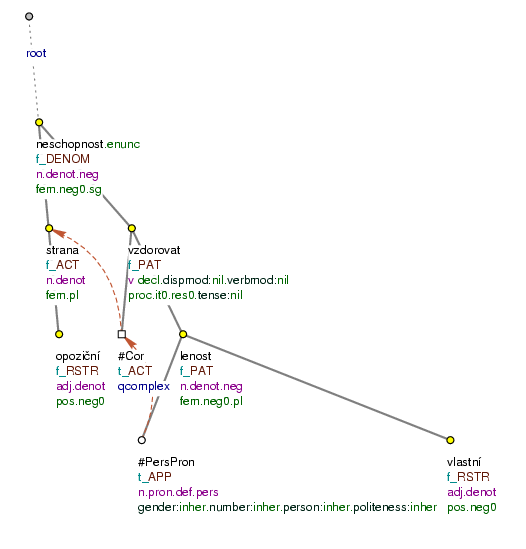
Neschopnost opozičních stran vzdorovat své vlastní lenosti. (=lit. Inability (of) oppositional parties to_resist self's own laziness)
Figure 9.3. Coreference with reflexive pronouns
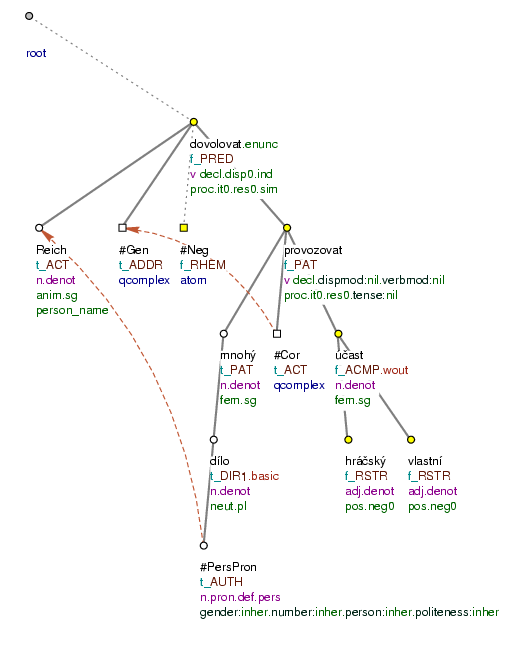
Mnohá ze svých děl Reich nedovoluje provozovat bez vlastní hráčské účasti. (=lit. Many of self's pieces Reich not_allows to_perform without self's player's presence)
Figure 9.4. Coreference with reflexive pronouns
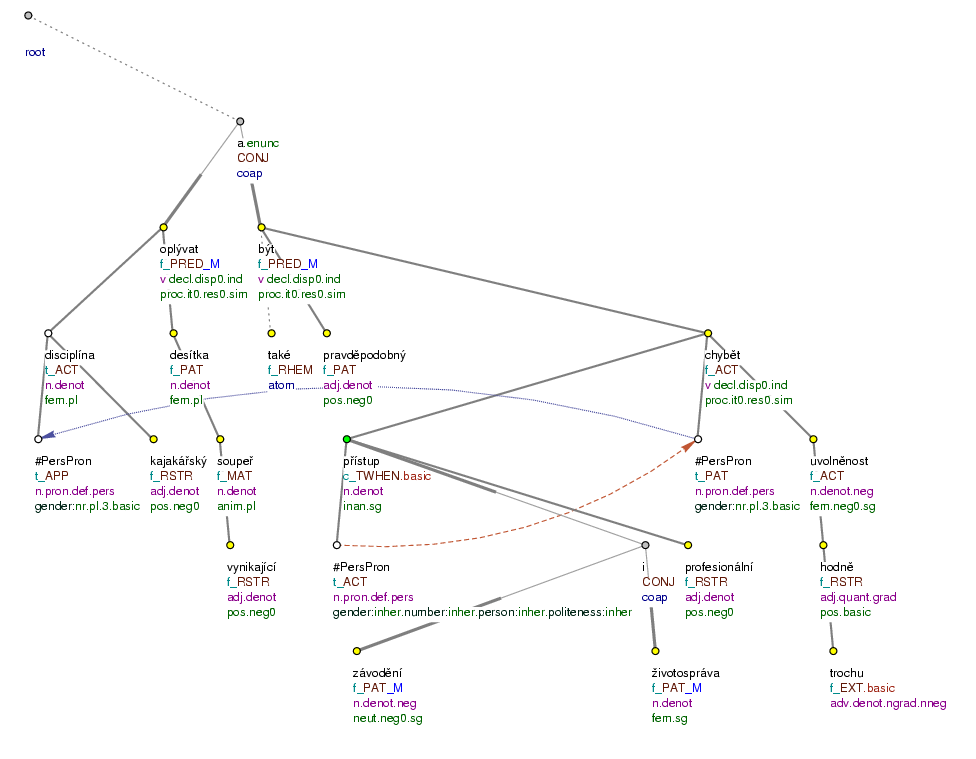
Jejich kajakářské disciplíny oplývají desítkami vynikajících soupeřů a je také pravděpodobné, že při svém profesionálním přístupu k závodění i k životosprávě jim chybí trochu víc uvolněnosti. (=lit. Their kayak disciplines abound_in tens (of) outstanding rivals and is also likely, that with self's attitude to competition as_well_as to regime them lack a_bit more composure)
Figure 9.5. A non-reflexive pronoun in place of a reflexive pronoun
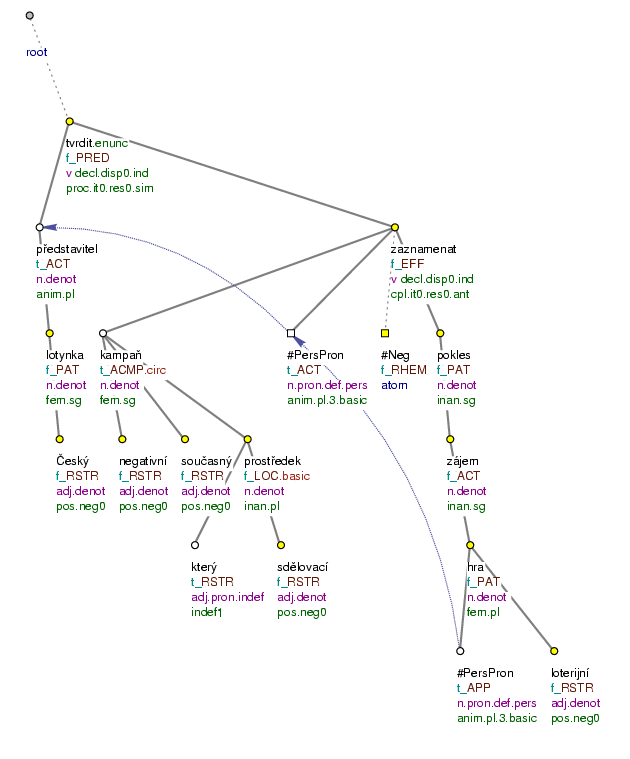
Představitelé České lotynky tvrdí, že v souvislosti se současnou negativní kampaní v některých sdělovacích prostředcích nezaznamenali pokles zájmu o jejich loterijní hry. (=lit. Representatives (of) Česká lotynka claim, that in connection to present negative campaign in some news media (they) not_registered decrease (of) interest in their lottery games)
Cases when a reflexive is used with no coreference involved. No coreference is involved in two cases in which a reflexive is used:
-
there is no coreference relation involved if the reflexive is part of a set expression, an idiom. Such a use of the reflexive is signalled by the
DPHRfunctor (see Section 8, "Idioms (phrasemes)").Examples:
Cena akcií vzrostla i u IPB, což je svým způsobem podivuhodné. (=...which is strange in a way (=lit. self's way.INSTR))
Svého času jsme to tak dělali. (=At one point (=lit. self's time.GEN) we did it this way)
To je problém sám o sobě. (=It is a separate problem; lit. problem alone about self)
-
the so-called ethical dative signalled by the
BENfunctor does not involve coreference either (see Section 9.1, "BEN").Example:
Potentáti v bance koupí za deset, prodají si za patnáct. (=lit. ... (they) sell self.DAT for fifteen)